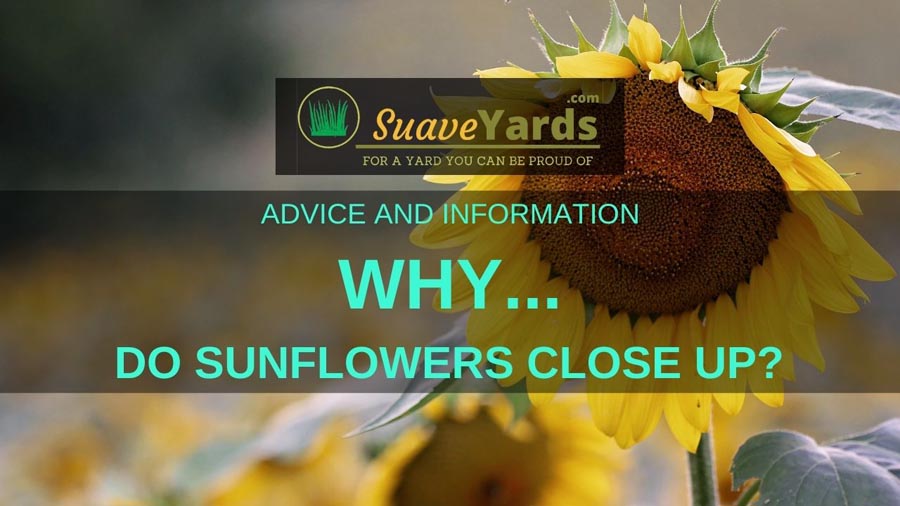
Seeing the vibrant head of a sunflower closing up is doubly frustrating.
One, because it deprives us of their cheerful look and two because it can often come without warning.
So why do sunflowers close up?
And come to think of it, why do they sometimes not even open?
We will look at all of that and more here.
Why Do Sunflowers Close Up?
If you find your sunflower suddenly closes up it is most likely because it is not getting a minimum of six hours of direct sunlight a day, so your first action should be to remedy this. If your sunflower is remaining closed and not blooming it could again be due to a lack of sunlight, or it could simply be waiting to bloom, remember some varieties of sunflower take up to 120 days to bloom.
Reason #1: They Might Not Be Getting Enough Sun
Sunflowers don’t require too much, but one thing they do need is lots of sun.
In fact, to grow properly, sunflowers need at least six hours of full sunlight a day.
If they don’t get enough sunlight it will slow their development and can cause retardation of the flower bud.
If you notice your sunflower has closed up, make sure it is in a location that receives as much sun as possible.
If necessary move it to a sunnier location or cut back any plants that might be shielding it.
Reason #2: They Might Be Getting Too Much Sun

Now I know it might seem strange that both too little and too much sun could be the reason for your sunflower closing up, but bear with me here.
RELATED ===> What Do Sunflowers Smell Like?
As much as sunflowers adore the sun, if they are exposed to excessive sunlight and unusually high temperatures, they may droop, wilt, close up and even eventually die.
If you think this might be the case, use a net or something similar to protect your sunflowers from the scorching sun.
Reason #3: They Could Be Suffering Transplant Shock
If or when you dig up a sunflower to move it to a different location, whether that be from inside to outside or simply moving it across your garden, you need to be very careful.
If you move your sunflower and notice it begins wilting or drooping or the flowers closing up, it could be suffering from transplant shock
This is because moving the plant may affect its root system and it is adapting to a change of soil, location and general disruption to its routine.
If you transplant your sunflower, make sure you dig a deep hole and make sure you move the sunflower with its roots fully intact, including the soil attached to its roots.
When you put the sunflower in its new location, add some compost and fertilizer to dampen the possibility of transplant shock and water it regularly to begin with.
Reason #4: They Could Be Making Seeds
When a sunflower has fully bloomed and been completely pollinated, it begins to make seeds, so new flowers can emerge and the life cycle can start again.
As it becomes heavy with seeds the head may droop and appear to close.
This is so the seeds can fall to the ground ready to grow again the next year.
Why Do Some Sunflowers Not Bloom?
Along the same lines, there are often reasons a sunflower’s buds remain closed and it looks like they might not bloom.
So if you are wondering why your sunflower isn’t opening, it could be one of the following reasons…
Reason #1: They Aren’t Getting Enough Sun
Yes, the most obvious reason again is lack of sunlight.
As mentioned previously sunflowers need at least six hours of sunlight a day to bloom properly.
If they don’t get this, they either will have smaller flowers than those grown in the required sunlight, or they may not bloom at all.
Make sure your sunflower is getting direct sunlight too, being in a bright spot with indirect sunlight is not sufficient.
Reason #2: They Might Not Be Ready to Bloom Yet
Growing sunflowers is a waiting game.
They can look tall enough and strong enough to bloom, but still nothing.
RELATED ===> How To Stop Wasps Eating Sunflower Stems?
Nature runs to its own timescale, and everything, including sunflowers, has its own life cycle and schedule.
Even some dwarf varieties of sunflowers need over 85 days before they bloom and some of the bigger varieties take 110 to 120 days to bloom.
So if your sunflower hasn’t opened yet, don’t worry too much, it might just need a bit more time.
Reason #3: They Might Not Have Been Planted In Time

On the subject of timescales, if you failed to sow the seed in time it may, unfortunately, remain closed.
Seed packets tell you how long a seed will take to mature. If your sunflower takes 80 days to mature and you plant the seeds 50 days before the end of the growing season, you will never see that beautiful flower bud.
You need to sow your sunflower seeds as soon as the soil is warm enough. So try and plant it as soon after the last frost date in spring as possible.
Reason #4: The Soil Might Be Prohibiting Their Growth
As well as sunlight, sunflowers love moist soil that drains well.
If a sunflower is growing in cold or wet soil, or soil that is sandy or nutrient poor, it will not grow in a healthy manner and may not bloom.
Although fertilizer can help a sunflower bloom, it isn’t needed as a sunflower would expect the soil it is growing in to provide it with everything it needs.
However if you do decide to give your sunflower a helping hand with some fertilizer, pay close attention to the nitrogen content in it.
Too much nitrogen in the soil may also stop a sunflower from blooming, causing it to grow plenty of dark green leaves, but no flowers.
Reason #5: Watch Out For Rogue Deer
Ok so this might not be a case of a sunflower not opening due to some kind of deficiency of sunlight or poor soil, but…
If you live in an area with lots of wild animals, be especially wary of deer, they love to chomp on flower heads and are known to bite the heads from stalks before they have a chance to bloom.
Reasons #6: Insects Could Be Preventing Them From Blooming
With their bright colors and abundance of nectar and pollen, sunflowers are hugely inviting to insects, and there are some that can stop a sunflower from blooming.
In particular, I am talking about sunflower midges and sunflower moths.
The larvae of sunflower moths will feed on the inside of sunflower heads, and can also cause a fungicidal disease that rots the flower heads before and during blooming.
Thankfully other pollinators that swarm to sunflowers usually take care of these pests, but if they don’t there is usually no other solution than to remove the infested heads and carefully dispose of them.
Sunflower midges also cause problems by laying their eggs inside sunflower heads. They develop inside and feed on them.
Again this can damage the sunflower head so much that you will get no blooms on any plants affected.
Your best bet if beset by midges, is to avoid planting sunflowers in areas you know midges can be found, or better still, plant varieties that tolerate midge damage.
Reason #7: A Bud Could Be Damaged
Sunflowers grow one bloom to one stem.
This means if a tiny bud grows at the end of a stem, but is damaged or removed by someone or something, then it can’t simply grow a new bud. A whole new stem has to grow to produce a flower bud.
If you notice a new stem growing, this may have happened.
Do Sunflowers Close at Night?

On the subject of why do sunflowers close up, I thought it was worth addressing a misconception.
Some people believe sunflowers close at night.
This isn’t true.
So what happens to sunflowers at night?
Well, mature sunflowers do nothing at night, or in fact during the day. They simply stand still.
Younger sunflowers, that are still growing, don’t close up at night either, but they do move round to the east in anticipation of the sun rising the next morning.
RELATED ===> How Long Can Sunflowers Go Without Water?
During the day the east side of a young sunflower’s stem grows, causing the sunflower head to bend from east to west, making it effectively follow the sun.
At night, when the sun sets, the west side of the sunflower stem grows, causing it to bend back to the east ready for it to follow the sun again.
When sunflowers are fully grown there is no need for them to do this.
This sun-tracking movement is known as heliotropism.
Final Thoughts
If you are wondering why your sunflower has closed up there could be a number of reasons, but the most common is a lack of sun.
Again if you are wondering why your sunflower has remained closed up and isn’t blooming, the most likely explanation is a lack of sun.
They are called sunflowers for a reason!
There are several other factors that can cause this, but the first thing you should always do is make sure they are getting at least six hours of direct sunlight a day.
If they are, then go through the other reasons listed above and hopefully you will find the culprit.

